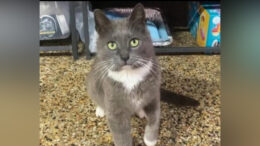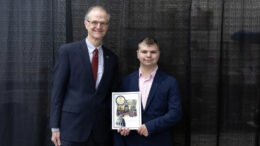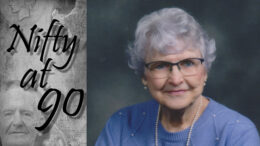By DYLAN LU
Student contributor
Alan McGill, Senior Supervisory Special Agent from the PA Office of the Attorney General, is a member of the Executive Board of National Association of State Controlled Substance Authorities (NASCSA) and was formerly an undercover narcotics agent and a private detective. He had been a professional investigator for 30 years and has been in the field of drug based law enforcement for 23 years.

Speaking with great intention, Agent McGill introduces the videos students would then watch showing the effects of cyber-bullying. (By AJ Howard, Student Contributor)
“I began as a private detective because I wanted to help people,” McGill said. “As a young boy I was bullied in school. When I reached high school I found myself helping my classmates that were bullied by others.”
Over his career, he has held multiple titles and had many assignments such as supervisor at the Pinkerton Detective Agency, Subject Matter Expert in Drug Diversion Narcotics, and Clandestine Laboratory Enforcement Team Member. In April of this year, he transferred to the Office of Public Engagement and trains doctors, nurses, pharmacists, and law enforcement.
McGill came to Cranberry High School to present a program named “Digital Citizenship”. This presentation is on a still relatively new issue for law enforcement, Social Media and the internet, along with the issues it can bring with it, notably cyber-bullying and online predators. He has been conducting training lectures for Fraud Prevention and Social Media awareness across the region.

Digital Citizenship presentation from the PA Office of Attorney General (By AJ Howard, Student Contributor)
For the first part of the presentation, he talked about a person’s digital footprint. A digital footprint would be every single picture, post, video, message, or other related item that has been released to the world wide web by someone. Anyone, provided he or she has access to the correct servers, can find any and all of this information about someone. Anything said or done online can be found and traced back to the sender with the right tools and not much can be done to erase it aside from wiping out the power grid.
Now you may be wondering why would anyone want to see your history if you haven’t done anything illegal, but nowadays, many colleges and workplaces care a great deal about how you conduct yourself online as well as in real life. Many otherwise valid and worthwhile candidates have been turned away from these opportunities because of something inane they did on their social media.
Next, Special Agent McGill began to discuss cyber-bullying and how it can affect people. He showed students videos of people who have been affected by cyber-bullying, and students saw from their eyes how things progressed and how it severely damaged lives.

Warning students about the dangers of friending strangers on social media, Agent McGill concludes his presentations with advice for teens. (By Lindsay Perry, Student Contributor)
In the first of the stories, a young lady in 7th grade was bullied by her peers. It eventually got to the point where she joked about hurting them in order to vent with a friend, but unfortunately, no one could tell that she was joking online. The police intervened because they couldn’t risk letting a potential threat fall through the cracks. The girl, a model student, was sent to a juvenile detention center and it impacted her greatly.
In the second story, a young man was bullied by another young man who harassed him online using his own and others’ accounts to unrelentingly harass and bully the first young man, whether it would be about how he looked, how he talked, and what he liked. The bully called the young man on the phone and would make fun of him and hack into other people’s accounts to harass them using those accounts. This pushed the young man past his breaking point, and unfortunately caused him to take his own life. We heard the story from his heartbroken mother who lost a son she shouldn’t have had to lose, a son who was tormented to the point that he thought leaving this plane of existence was his only option.

Agent McGill shares with students about their digital footprint. (By Lindsay Perry, Student Contributor)
In the third and final part, McGill discussed a fairly popularized issue: Child predation and fake profiles. Though we all know anyone can make a profile with anything in it, when someone follows us or attempts to friend us, would most of us really look into who they really are? You may think that you won’t fall for it, you’re too smart! Honestly though, if someone intriguing and cool added you as a friend and got close to you, you wouldn’t be alone in the group that would be dying to meet them. Even if you don’t believe you would fall into that trap, imagine how it would affect young and impressionable teenagers and children, especially when they become more secretive with their online content. You have to hope they make wise choices, choices they won’t regret and even just sitting down and talking with them about it can achieve a great deal of good.
After his presentation, we invited McGill to sit with us and asked him if he would answer some questions for us. He graciously accepted and as a result, we now have the interview contained in this article.
Dylan Lu and Lindsay Perry are students at Cranberry High School and members of Cranberry Chronicles, the school’s journalism/publications group.






































